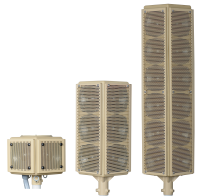VR
| Sentry VR | |

| |
| Company | Sentry Siren, Inc. |
|---|---|
| Produced | 2018-2020 |
| Type | Omnidirectional Electronic |
| Sound output | 120 dB (claimed) |
| Wattage | 600-3200 W |
| Succeeded by | Sentry SV-8 |
| Documentation | Product sheet |
The VR is an electronic siren that was produced for a short time by Sentry Siren, Inc. Being Sentry's very first attempt to enter the electronic siren market, the siren was only produced for a short time as Sentry failed to establish a foothold in the market. It was later succeeded by the SV-8.
History and design
The VR was announced and introduced in 2018 on Sentry's website. The siren was advertised as a Giant Voice siren, being intended to function as a public address and notification system prioritizing voice clarity over raw sound output. The siren is essentially a HyperSpike MA-series set of speakers with a custom-built controller made by Sentry themselves, with three different sizes of speaker being available. These were advertised by Sentry as reaching up to 120 dB at 100 ft while having an incredible speech transmission index (STI) rating of 0.91 out of 1.00. This meant that it would be able to be clearly heard and understood over a great distance, which was the siren's main selling point. The controller was limited to either 4 siren tones, voice messages, or a combination of the two. In addition, the alert tone peaked at 800 Hz, which was not as effective as a lower tone. This made the siren perform rather poorly as a siren, but excels at voice communication as a PA system.
The siren itself is a HyperSpike MA-series mass notification speaker. Each speaker is made up of 5-30 speakers, and was available in three different sizes. Each speaker array contained 1-6 speakers per direction, in 5 different directions. The siren uses no horns to project the sound, instead using cone speakers attached to the drivers in order to provide a clear broadcast at the cost of overall range. To compensate for this, the siren runs at a higher voltage, with the smallest model, the 5-speaker VR-1, using up 600 W of power. Each speaker is contained inside a frame, with the VR-1 coming in a cube-shaped frame while the VR-5 and VR-10 come in a rectangular frame, with the speakers stacked vertically. The VR-1 has 5 speakers and runs on 600 W, the VR-5 has 15 speakers and runs on 1375 W, and the VR-10 has 30 speakers and runs on 3200 W. Each speaker is protected by a mesh screen to keep moisture out.
The VR was a complete failure for Sentry. Due to being a niche product that was poorly marketed, less than a dozen overall units are known to have been sold. In addition, Sentry's overall preference for mechanical sirens caused their attention to be focused away from the VR. This, combined with the siren's overall performance lacking compared to competing sirens such as the Modulator or WPS-2900, led to the siren's quiet discontinuation in 2020. This wouldn't be Sentry's last attempt to enter the electronic siren market, however, as Sentry later announced the SV-8, which succeeded it in 2023. Today, only a handful of units exist, with a few units installed in Jersey Village, TX, while others were installed at a school campus.